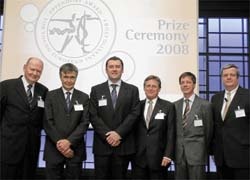The Eppendorf Young Investigator Award 2008
The 14th Eppendorf Young Investigator Award 2008, worth ?15,000, was presented at MEDICA in November.

The winner, Dr Simon Boulton of the DNA Damage Response Laboratory, London Research Institute (UK), received the award for his work describing a novel protein that impacts human genome stability and cancer. By combining his knowledge of Caenorhabditis elegans (a nematode) and yeast DNA repair systems, he devised a screening strategy that led to the discovery of a novel helicase in C. elegans, which has many of the properties of the yeast helicase. He then identified the human counterpart (RTEL-1) and could demonstrate that this protein functions as an anti-recombinase. Dr Boulton managed to identify this anti-recombinase activity, which is important for maintaining genome stability in animals. In RTEL-1 deficient mice, activity deregulation of homologous recombination is the probable cause of the loss of genome integrity. Conversely, over-expression of RTEL-1 also causes cancer through promiscuous disassembly of the recombination intermediates involved in repair and leading to mutations that cause cancerous growth. A prospective therapeutic drug is already being tested clinically.
During his acceptance speech at a gala dinner attended by scientists and those from related industries, Dr Boulton mentioned his PhD supervisor Professor Stephen Jackson, from the Wellcome/CRC Institute, Cambridge (UK), who received the first Eppendorf Young Investigator’s Award in 1995. Other speakers were Dr Michael Schroeder of Eppendorf, Dr Nick Campbell of Nature publishing group, Professor Kai Simons, Director of the Max-Planck-Institute of Molecular Cell Biology and Genetics in Dresden, and Professor Hermann Gaub from Munich.
Launched in 1995 to coincide with Eppendorf’s 50th anniversary, the prize honours outstanding molecular biology-based, life sciences research work in Europe, sponsoring young European scientists (up to 35 years old). To raise the award’s profile further, a partnership with the publishing group Nature was forged. The group publicises the winner’s work via a blog and podcasts to an ever growing internet community of young research scientists representing the future of biomedical research.
Eppendorf AG has strong links with this research field and its founders want the award to reflect their commitment to advancing research in healthcare. An independent scientific committee selects the annual winners, each receiving a personal gift of ?15,000.
Award details: www.eppendorf.com/award
2009 award applications: http://www.nature.com/
nature/awards/eppendorf
20.12.2008











